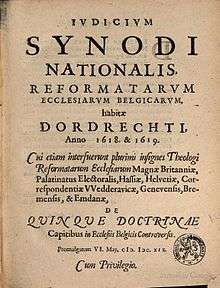Canons of Dort

The Canons of Dort, or Canons of Dordrecht, formally titled The Decision of the Synod of Dort on the Five Main Points of Doctrine in Dispute in the Netherlands, is the judgment of the National Synod held in the Dutch city of Dordrecht in 1618–19.[1] At the time, Dordrecht was often referred to in English as Dort or Dordt.
Today the Canons of Dort form part of the Three Forms of Unity, one of the confessional standards of many of the Reformed churches around the world, including the Netherlands, South Africa, Australia, and North America. Their continued use as a standard still forms an unbridgable problem preventing close cooperation between the followers of Jacob Arminius, the Remonstrants, and Dutch Reformed Churches.
These canons are in actuality a judicial decision on the doctrinal points in dispute from the Arminian controversy of that day. Following the death of Arminius (1560–1609), his followers set forth a Remonstrance (published in 1610) in five articles formulating their points of departure from the stricter Calvinism of the Belgic Confession. The Canons are the judgment of the Synod against this Remonstrance. [2] Regardless, Arminian theology later received official acceptance by the State and has since continued in various forms within Protestantism, especially within the Methodist churches.[3]
The Canons were not intended to be a comprehensive explanation of Reformed doctrine, but only an exposition on the five points of doctrine in dispute.[4] The five points of Calvinism, remembered by the mnemonic "TULIP"[5] and popularized by a 1963 booklet,[6] are popularly said to summarize the Canons of Dort.[7] Also see Stewart's essay in chapter 3.[8] However there is no historical relationship between them, and some scholars argue that their language distorts the meaning of the Canons.[9]
Notes
- ↑ Horton, Michael (2011). The Christian Faith. Grand Rapids: Zondervan. p. 562. ISBN 0310286042.
- ↑ Peterson, Robert; Williams, Michael (2004), Why I am not an Arminian, Downers Grove: InterVarsity Press, p. 124, ISBN 0830832483
- ↑ Olson, Roger E. (20 August 2009). Arminian Theology. InterVarsity Press. p. 14. ISBN 9780830874439.
Arminian theology was at first suppressed in the United Provinces (known today as the Netherlands) but caught on there later and spread to England and the American colonies, largely through the influence of John Wesley and the Methodists.
- ↑ "Canons of Dort". 4 June 2012.
- ↑ Total depravity, Unconditional election, Limited atonement, Irresistible grace and Perseverance of the saints.
- ↑ Stewart, Kenneth J. (2008). "The Points of Calvinism: Retrospect and Prospect" (PDF). Scottish Bulletin of Evangelical Theology. 26 (2): 189–193.
- ↑ R. C. Sproul (1997), What is Reformed Theology?, Grand Rapids: Baker Books, pp. 27–28
- ↑ Stewart, Kenneth J. (2011). Ten Myths about Calvinism. Downers Grove, Illinois: InterVarsity Press.
- ↑ Muller, Richard A. (2012). Calvin and the Reformed Tradition (Ebook ed.). Grand Rapids, MI: Baker Academic. pp. 50–51.
Further reading
- But for the Grace of God by Cornelis P. Venema
- The Golden Chain of Salvation by John Bouwers
- Unspeakable Comfort by Peter Feenstra
- The Voice of our Fathers by Homer Hoeksema
- The Reformed Doctrine of Predestination by Lorraine Boettner
- The Synod of Dordt by Thomas Scott
- The Canons of Dordt by Henry Peterson
- The Five Points of Calvinism by David Steele and Curtis Thomas
- The Works of John Owen, Vol. 10
- TULIP by William Jay Hornbeck II